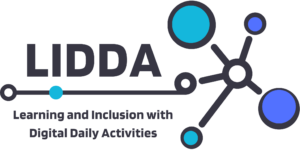LIDDA (Learning and Inclusion with Digital Daily Activities)
Project number: 2024-1-SI01-KA220-ADU-000243489
Project duration: 31. 12. 2024 – 30. 4. 2027
About project:
Lithuanian Welfare Society for Persons with Intellectual Disability “Viltis”, together with its partners, is implementing the ERASMUS+ project “Learning and Inclusion with Daily Digital Activities” (LIDDA).
The goal of this project is to provide people with intellectual disabilities with the skills needed to live independently in today’s digitized society. Digital literacy is necessary to take advantage of online opportunities and access various electronic services, such as banking, healthcare, taxes, public transport, etc. People with intellectual disabilities experience digital exclusion: there is a lack of education and accessible information that would allow them to fully utilize electronic services.
Partners:
- Center za izobraževanje in kulturo Trebnje – Slovenia (coordinating organisation)
- Zavod RISA, Center za splošno, funkcionalno in kulturno opismenjevanje– Slovenia
- VšĮ NEKSER – Lithuania
- Lietuvos sutrikusio intelekto žmonių globos bendrija „Viltis“ – Lithuania
- UNIAMOCI APS – Italy
Objectives:
- To provide people with intellectual disabilities with the necessary digital skills to function in modern society.
- To contribute to the inclusion of people with intellectual disabilities in the digital space.
- To improve the competencies of educators so that they can create innovative digital educational content adapted for people with intellectual disabilities.
- To adapt the methodology and learning modules in various EU disability environments, by providing policy recommendations for the integration of the methodology into educational systems for people with disabilities, targeting policymakers and disability centers, as well as specialists.
Target groups:
- Adults with mild intellectual disabilities.
- Educators and other specialists working with people with intellectual disabilities, and organizations operating in the disability sector.
- Professionals and policymakers working in the field of inclusive education.
- Other potential end-user groups, such as people with learning difficulties, older persons experiencing cognitive decline, people with neurological disorders, or brain injuries.
- The general public, which we will reach during the project through media and social networks.
Results:
- Creation of a MOOC (Massive Open Online Course). This is a platform for educators that allows for self-directed learning and the creation of digital educational content for people with intellectual disabilities.
- Micro-learning modules for individuals with intellectual disabilities, covering various electronic services and online dangers.
- Recommendations for the integration of the methodology into the educational systems for people with intellectual disabilities, aimed at policymakers, educational organizations, and specialists.
Funded by the European Union. Views and opinions expressed are however those of the author(s) only and do not necessarily reflect those of the European Union or the European Education and Culture Executive Agency (EACEA). Neither the European Union nor EACEA can be held responsible for them.

